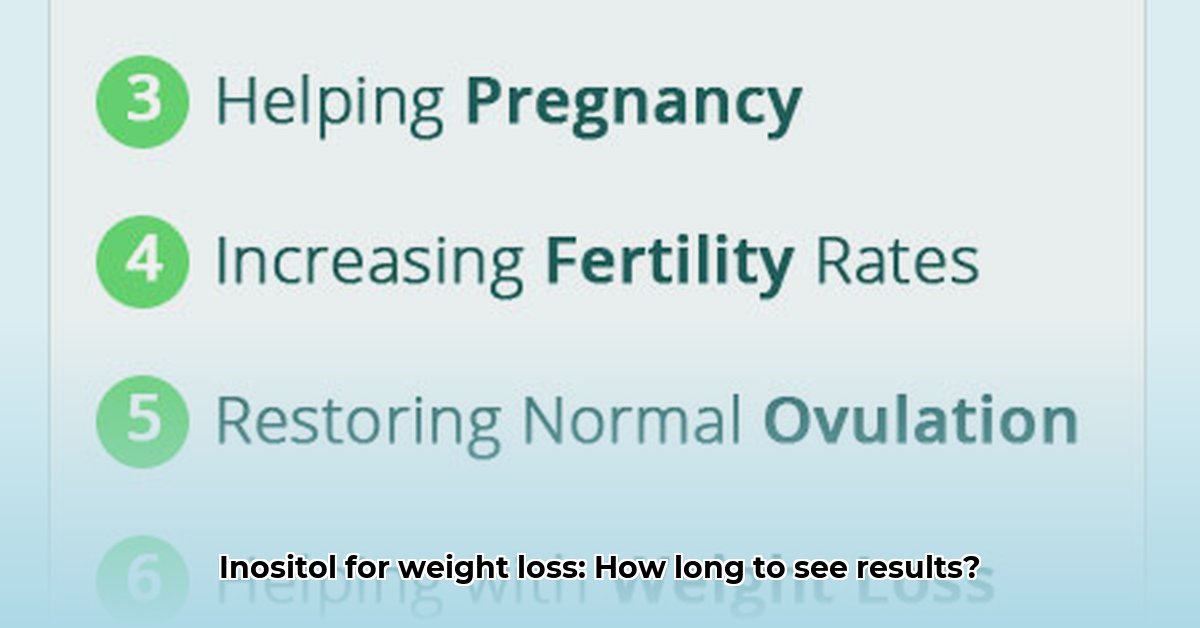
How Long for Inositol to Work for Weight Loss?
The question of how long inositol takes to aid weight loss lacks a simple answer. Research suggests a potential benefit, particularly for individuals with insulin resistance, but the timeframe is highly variable and depends on several factors. Many studies have shown promising results, but larger-scale trials are needed to solidify these findings. Is it a quick fix? No. Is it a potentially helpful addition to a weight-loss strategy? It seems so for some, but not all.
Understanding Inositol's Role in Weight Management
Inositol, specifically myo-inositol (MI), is a naturally occurring compound. Its potential connection to weight loss largely stems from its influence on insulin sensitivity. Improved insulin sensitivity means your body processes glucose more efficiently, potentially reducing weight gain associated with insulin resistance. However, it’s crucial to remember that inositol’s effect isn't universally consistent. Some studies have demonstrated a correlation between inositol supplementation and reduced BMI, especially in individuals with Polycystic Ovary Syndrome (PCOS), but the evidence isn’t yet conclusive for all populations. Does this mean inositol is a guaranteed weight-loss solution? No. But could it potentially contribute to weight management? The research suggests it might, particularly for some groups.
Isn't it frustrating that there's no magic number for how long it takes? The lack of a definitive answer underscores the complexity of weight loss and the individual variability in response to supplements.
Factors Influencing the Timeframe
Several variables influence how quickly, or even if, you see any weight-related changes from inositol supplementation. A key factor is the dosage: studies employ varying inositol amounts, with optimal dosage remaining unclear. "The specific dosage needed varies greatly from person to person," explains Dr. Anya Sharma, Endocrinologist at the Mayo Clinic. Your individual health status also plays a significant role. Inositol appears more effective for individuals with insulin resistance, such as those with PCOS, compared to those without these conditions. Finally, lifestyle matters immensely; inositol shouldn't replace a balanced diet and regular exercise. It's more like a supportive player on a team than the sole star.
Managing Expectations: A Long-Term Commitment
It's essential to approach inositol with realistic expectations. It's not a rapid weight-loss solution, but rather a potential supporting tool within a comprehensive strategy. Think of it as one piece of the puzzle, not the entire picture. Remember, sustainable weight management is a journey, not a sprint. What's more important: progress or perfection? Progress.
Actionable Steps for Inositol Use
Here’s a practical approach to using inositol for weight loss:
Consult Your Doctor: Discuss its suitability with your doctor, especially if you have pre-existing health conditions or are taking other medications. ("Always consult your doctor," advises Dr. David Lee, Registered Dietitian at UCLA Health).
Start with a Low Dose: Begin with a lower dosage and gradually increase it as advised by your healthcare provider. Monitor for any potential side effects. ("Start low and go slow," emphasizes Dr. Sharma).
Integrate Lifestyle Changes: Couple inositol with a healthy diet and consistent exercise routine. Remember, lifestyle changes are foundational to weight management. (A balanced diet and exercise is crucial, according to Dr. Lee).
Track Your Progress: Monitor your weight, blood sugar levels (if applicable), and overall well-being to assess the effectiveness of inositol.
Be Patient: Results take time. Consistency and patience are key to long-term weight management success.
Weighing the Potential Benefits and Risks
| Feature | Potential Benefits | Potential Risks |
|---|---|---|
| Insulin Sensitivity | Potential improvement, aiding weight management, particularly in PCOS. | Individual responses vary; not guaranteed to improve insulin sensitivity. |
| PCOS | May improve certain metabolic markers but is not a standalone treatment. | Not a complete PCOS solution; needs integration into a comprehensive plan. |
| Appetite | Some studies suggest a potential influence, but research is inconclusive. | Any appetite change isn't consistently observed in all studies. |
| Side Effects | Generally well-tolerated; mild digestive upset is possible. | Potential drug interactions; always monitor for side effects. |
Key Takeaways:
- Inositol's role in weight loss is promising, specifically for those with insulin resistance.
- The research, while encouraging, isn't entirely conclusive yet.
- Individual responses vary significantly.
- Always consult your doctor before starting any supplement regimen.
- Lifestyle changes remain paramount to sustainable weight management.
The duration for inositol to impact weight loss is highly individual and dependent on several factors. It's a tool within a larger strategy, requiring both a realistic outlook and patient persistence.